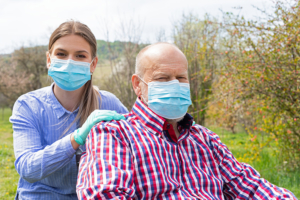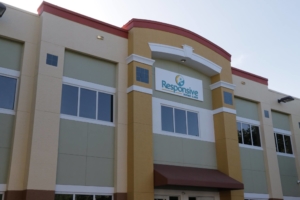Safe Senior Home Care During the Pandemic

Learn how to choose a safe home care provider.
Looking at the past several months, family caregivers have had to manage seemingly insurmountable challenges connected with the care of the seniors they love. With COVID-19’s particular dangers to the elderly and people with underlying medical conditions, such as for example COPD, diabetes, cardiovascular disease, and others which can be common in seniors, families have struggled with just how to hire safe senior home care during the pandemic.
To that particular end, some families made the difficult decision to pause home care services to prevent having anyone outside of the family come into the home – meaning they were suddenly responsible for full-time senior care. Without a care partner, this alone tends to be incredibly stressful, but add to this the various other new responsibilities and concerns brought about by the pandemic, for example shifting to working virtually, taking care of young children who could no longer attend school or daycare, and more.
To say it has been an overwhelming time is an understatement, but now, with numerous new safety protocols in place, is it safe to once again bring in a professional homecare agency to assist?
Responsive Home Care has continued to deliver safe senior home care throughout the pandemic, in accordance with all recommended guidelines. When you are prepared to look into in-home care options, keep these guidelines in mind:
- Work with an experienced home care agency, like Responsive Home Care, that has a well thought-out COVID-19 plan in place – and ask for information regarding that plan.
- Plan to be present once the caregiver arrives the very first time to help relieve any concerns you might have, such as making certain he/she is sanitizing surfaces, wearing a face covering, washing hands often, etc.
- Speak to the senior’s physician about any concerning health issues and also to get tips for any additional safety precautions that ought to be taken during home care visits.
The professional providers of home care in Pembroke Pines and the surrounding area at Responsive Home Care are always available to answer any questions you have as well as share information about the steps we are taking to protect the older adults in our care, including:
- Wearing face coverings along with other personal protective equipment as appropriate
- Properly disinfecting and sanitizing any items brought into the seniors’ homes
- Ensuring all care staff are healthy through routine temperature checks and wellness assessments
- Practicing safe social distancing protocol
- And more
Reach out to us at 954-486-6440 any time for more information regarding the countless benefits of professional in-home care, and ways in which we are able to assist an older adult you love live life to the fullest – safely and comfortably in the familiarity of home. See our full service area.

 “It takes a village” was never a more accurate statement than when caring for an adult loved one. Yet it’s necessary for that “village” to keep up successful, ongoing communication in order to offer the best care and be certain that everyone taking part in care is on the same page. It is also critical for family caregivers to have the opportunity to express concerns and to come together to get to resolutions, to share various perspectives, and to continue to be proactive in planning for the future.
“It takes a village” was never a more accurate statement than when caring for an adult loved one. Yet it’s necessary for that “village” to keep up successful, ongoing communication in order to offer the best care and be certain that everyone taking part in care is on the same page. It is also critical for family caregivers to have the opportunity to express concerns and to come together to get to resolutions, to share various perspectives, and to continue to be proactive in planning for the future. In Isaac Asimov’s opinion, “The easiest way to solve a problem is to deny it exists.” It’s a common feeling for a number of family caregivers when their loved one is diagnosed with a chronic condition, such as dementia. And even though this may generate some measure of comfort in believing that life can go forward like it always has, if only we refuse to admit this new reality, the truth is that acceptance is extremely important to obtaining necessary support.
In Isaac Asimov’s opinion, “The easiest way to solve a problem is to deny it exists.” It’s a common feeling for a number of family caregivers when their loved one is diagnosed with a chronic condition, such as dementia. And even though this may generate some measure of comfort in believing that life can go forward like it always has, if only we refuse to admit this new reality, the truth is that acceptance is extremely important to obtaining necessary support.

 It’s official: As of May 1, 2017, Responsive Home Health has changed its name to Responsive Home Care!
It’s official: As of May 1, 2017, Responsive Home Health has changed its name to Responsive Home Care! It’s a club no one wants to be a part of; however, as many as 10 million Americans have become members: sharing a
It’s a club no one wants to be a part of; however, as many as 10 million Americans have become members: sharing a  Exercise is one of the most important things anyone can do for their health, energy levels, and safety. When you’re talking about seniors living at home, it may not seem as important as it once did, but it’s actually one of the most important things people can do, regardless of their age.
Exercise is one of the most important things anyone can do for their health, energy levels, and safety. When you’re talking about seniors living at home, it may not seem as important as it once did, but it’s actually one of the most important things people can do, regardless of their age. February 7 is Bean Day. As a family caregiver this is the ideal opportunity for you to explore the ways that adding more beans into your aging parent’s diet can improve their health and support a higher quality of life as they age in place. With a huge variety of styles and virtually endless options for preparations, beans make an ideal component of nearly any healthy eating approach.
February 7 is Bean Day. As a family caregiver this is the ideal opportunity for you to explore the ways that adding more beans into your aging parent’s diet can improve their health and support a higher quality of life as they age in place. With a huge variety of styles and virtually endless options for preparations, beans make an ideal component of nearly any healthy eating approach. When you first start to notice your loved one having difficulty processing information, it’s scary. The situation can be scary for your elderly loved one, too, because cognitive issues can often mean that she’s about to lose some of her independence.
When you first start to notice your loved one having difficulty processing information, it’s scary. The situation can be scary for your elderly loved one, too, because cognitive issues can often mean that she’s about to lose some of her independence.